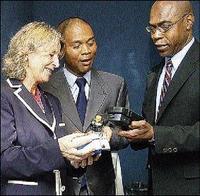
From left: Helen Jenkinson, chargé d'affaires, Delegation of the European Commission; Melvin Asin, head of infrastructure; and E.G. Hunter, president of the National Water Commission (NWC), view items donated by the European Union. They were at a press conference at the NWC's corporate office in New Kingston yesterday. - Junior Dowie/Staff Photographer
Faced with an average $50-million increase in its monthly electricity bill, the National Water Commission (NWC) yesterday warned that it would be intensifying its collection drive while it seeks to reduce its energy usage.
NWC President E.G. Hunter said the water company has been rocked by soaring oil prices which, for example, pushed its electricity bill for May to $385 million from the $345 million it paid the pre-vious month.
Hunter said in April 2007, NWC received a $177 million electricity bill from the Jamaica Public Service Company.
He was addressing a press conference on the European Union-funded project for technical support for the institutional strengthening of NWC, held at the water commission's corporate office on Barbados Avenue in New Kingston.
"Energy reduction is the new mantra," Hunter told the gathering.
He later told The Gleaner the NWC was continuing its programme to work with communities with a high level of delinquency, with a view to increasing payment.
"We are trying to establish a covenant of service with these communities," he said. "Their end of the bargain is to protect our equipment and pay on time."
Electricity is critical to pump water and Hunter said within the past four years, the NWC's energy consumption has increased by 4.5 per cent.
He noted that approximately 50 per cent of current monthly collection goes towards paying electricity bills. As a result, the NWC president said water-bill payment compliance must increase for the NWC to remain in business.
In May, the Office of Utilities Regulation approved a 28 per cent increase in water rates. However, the NWC was dissatisfied, claiming that it would not allow the entity to undertake all the projects it wants to pursue to increase efficiency and service.
NWC's most delinquent communities
Windsor Heights, St Catherine
Barrett Hall, St James
Old Braeton, St Catherine

